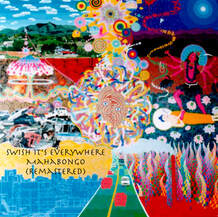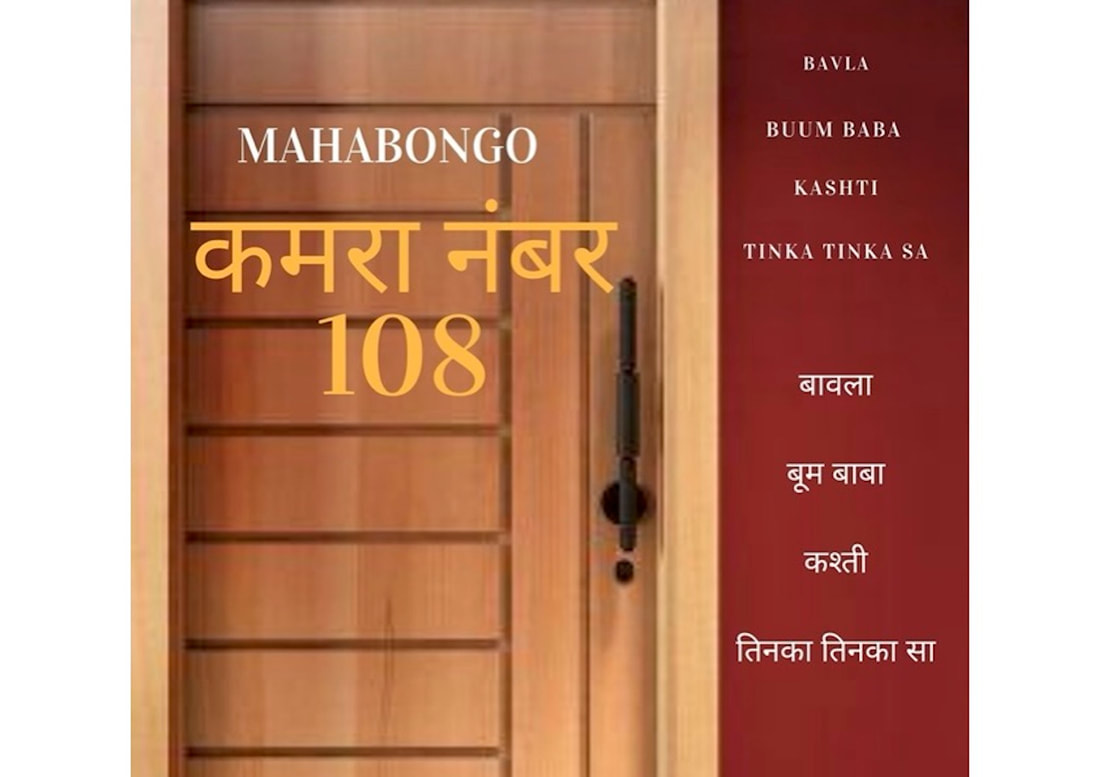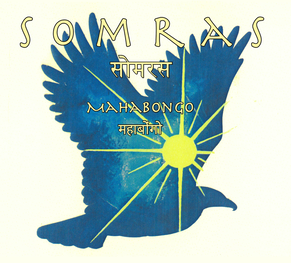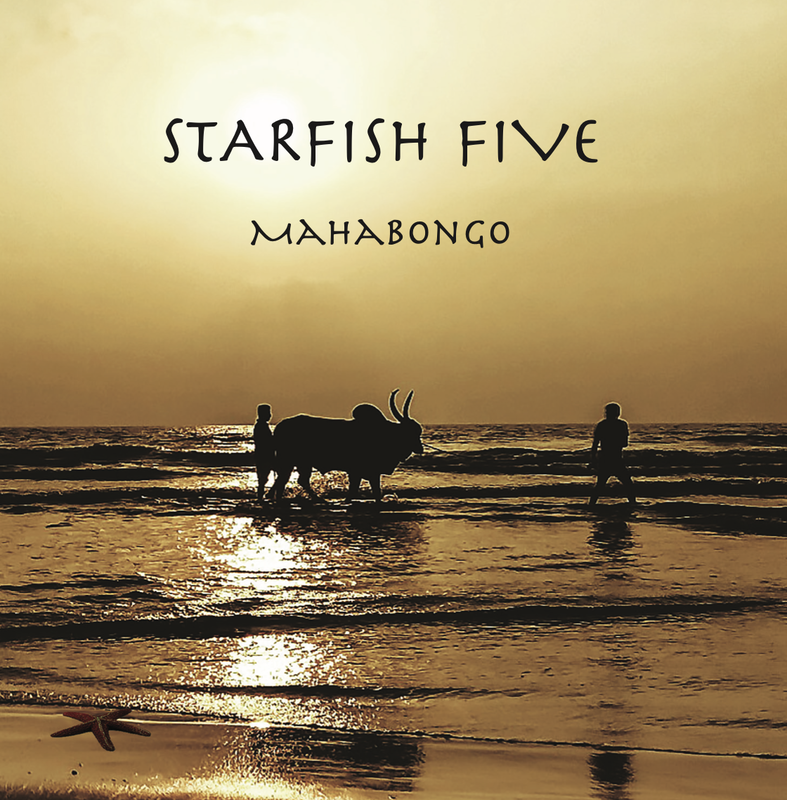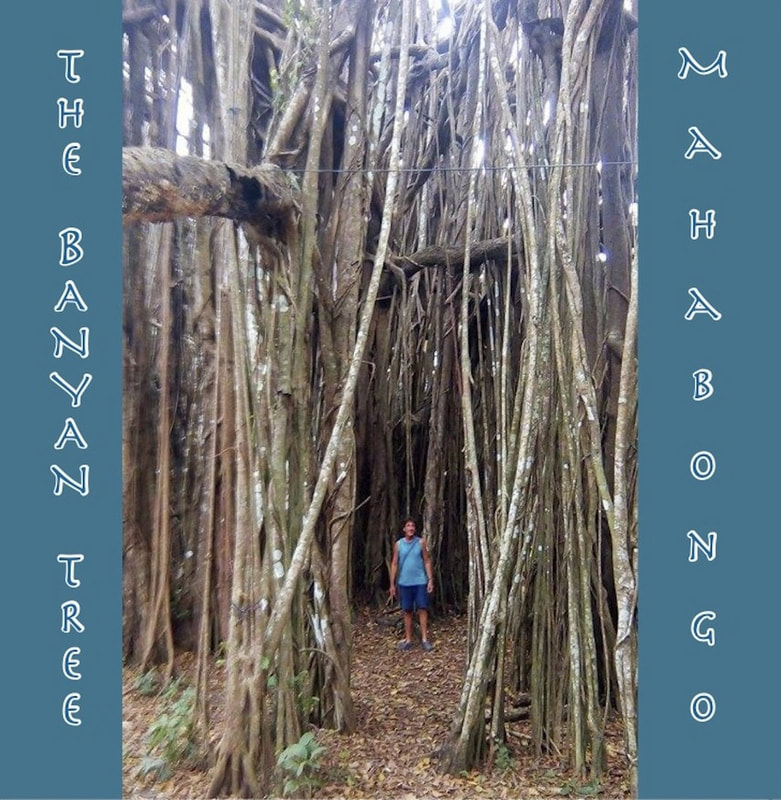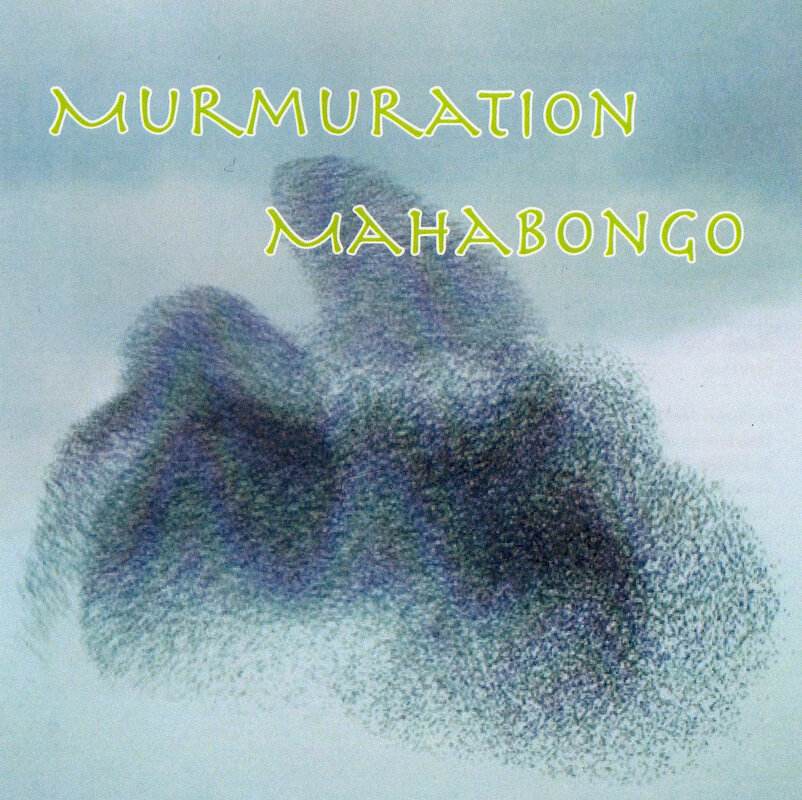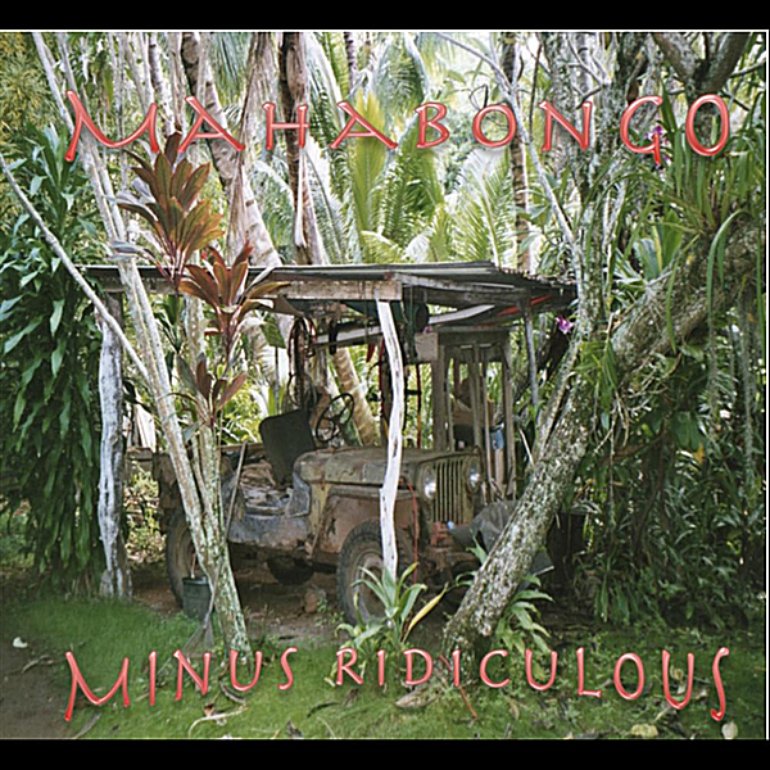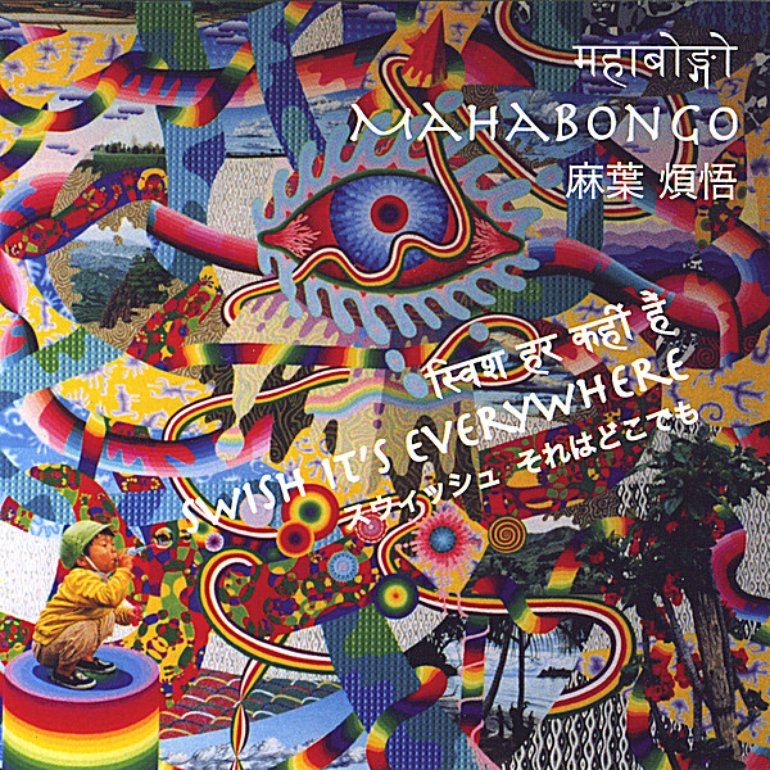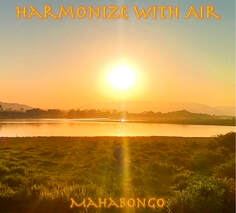
Harmonize With Air (2023)
1 Touch and Desire 3.26
2 Actors on Air 3.58
3 Versova 5.09
4 Plants in Conversation 3.10
5 People to the Rites 4.03
6 Casa Fernandez 4.06
7 Gilbert Hill 3.48
8 Andheri West 4.25
9 Fade at Noon 3.34
10 Alto Paraíso 3.45
11 So 3.47
12 High Cirrus 2.29
Dean Brodrick: keyboards, backing vocals (3, 11), percussion (1, 5, 7, 10)
Maddy Brodrick: vocals, backing vocals
Matthew Clark: guitars, additional vocals (7)
James Gullis: drums
Adam Johnson: drums (4), percussion (8)
Anita Munson: clarinet (3, 8)
Grant Ransom: guitar (1, 9)
Sasha Ryabina: vocals (8)
Ben Socrates: piano (8)
Suze Pole: saxophone (5, 9, 11)
Alfie Weedon: bass
Ben Weedon: violin (7, 10)
Eddy Wilson: vocals (1, 5, 11)
All songs written by Matthew Clark
Arranged, produced, engineered and mixed by Dean Brodrick
Addition engineering by Ben Weedon
String arrangement (7) by Ben Weedon
Recorded at South Barn, Camely, between November 2022 and July 2023
'High Cirrus' recorded live with a blackbird in Hove
Mastered by Patrick Wilson at Production Music Online
Cover and inside photograph by Anuj Kumar (Desaturation Zero)
Artwork by Ben Weedon
Huge thanks to all involved
mahabongo.com: MHB 009
℗ © Matthew Clark, 2023
2 Actors on Air 3.58
3 Versova 5.09
4 Plants in Conversation 3.10
5 People to the Rites 4.03
6 Casa Fernandez 4.06
7 Gilbert Hill 3.48
8 Andheri West 4.25
9 Fade at Noon 3.34
10 Alto Paraíso 3.45
11 So 3.47
12 High Cirrus 2.29
Dean Brodrick: keyboards, backing vocals (3, 11), percussion (1, 5, 7, 10)
Maddy Brodrick: vocals, backing vocals
Matthew Clark: guitars, additional vocals (7)
James Gullis: drums
Adam Johnson: drums (4), percussion (8)
Anita Munson: clarinet (3, 8)
Grant Ransom: guitar (1, 9)
Sasha Ryabina: vocals (8)
Ben Socrates: piano (8)
Suze Pole: saxophone (5, 9, 11)
Alfie Weedon: bass
Ben Weedon: violin (7, 10)
Eddy Wilson: vocals (1, 5, 11)
All songs written by Matthew Clark
Arranged, produced, engineered and mixed by Dean Brodrick
Addition engineering by Ben Weedon
String arrangement (7) by Ben Weedon
Recorded at South Barn, Camely, between November 2022 and July 2023
'High Cirrus' recorded live with a blackbird in Hove
Mastered by Patrick Wilson at Production Music Online
Cover and inside photograph by Anuj Kumar (Desaturation Zero)
Artwork by Ben Weedon
Huge thanks to all involved
mahabongo.com: MHB 009
℗ © Matthew Clark, 2023
'Swish It's Everywhere', the first album by Mahabongo (MHB 001), first released in 2008, has just been remastered by Patrick Wilson at Production Music Online. The sound has improved. We hope you like it.
1 Patterns of the Birds (4.58)
2 No Clouds in Your Sky (5.00)
3 Hawaii Blue (3.41)
4 Time Slips (4.36)
5 Dogs (4.37)
6 Spanish Sun (5.26)
7 An English Day (4.11)
8 West of the House (4.49)
9 Seaside Town (5.14)
10 Better Than That (3.09)
David Abram: clarinet (2, 4, 10), flute (10)
Dean Brodrick: keyboards
Matthew Clark: guitars, vocals, bamboo flute (3, 4)
Fergus Gerrand: percussion
Flaky Jake: accordion (6, 7, 8, 9, 10)
Greg Lester: electric guitar (4)
Ed Macdonald: additional bongos (10)
Luvain Maximen: backing vocals
Franc O'Shea: bass
Butch Thomas: saxophone (1, 3, 6, 7, 8, 9)
Darby Todd: drums
Songs composed by Matthew Clark.
Engineered and produced by Dan Thornton.
Recorded and mixed at Hippocampus (London),
between July and November 2007.
Remastered by Patrick Wilson (Production Music Online).
Cover picture by Ikuo Yakushimaru.
mahabongo.com MHB 008
2 No Clouds in Your Sky (5.00)
3 Hawaii Blue (3.41)
4 Time Slips (4.36)
5 Dogs (4.37)
6 Spanish Sun (5.26)
7 An English Day (4.11)
8 West of the House (4.49)
9 Seaside Town (5.14)
10 Better Than That (3.09)
David Abram: clarinet (2, 4, 10), flute (10)
Dean Brodrick: keyboards
Matthew Clark: guitars, vocals, bamboo flute (3, 4)
Fergus Gerrand: percussion
Flaky Jake: accordion (6, 7, 8, 9, 10)
Greg Lester: electric guitar (4)
Ed Macdonald: additional bongos (10)
Luvain Maximen: backing vocals
Franc O'Shea: bass
Butch Thomas: saxophone (1, 3, 6, 7, 8, 9)
Darby Todd: drums
Songs composed by Matthew Clark.
Engineered and produced by Dan Thornton.
Recorded and mixed at Hippocampus (London),
between July and November 2007.
Remastered by Patrick Wilson (Production Music Online).
Cover picture by Ikuo Yakushimaru.
mahabongo.com MHB 008
|
Kamra Number 108
Kamra Number 108 (2022) is an EP of four songs in Hindi, from the album Somras. The EP features the vocals of Swati Prasad, Chintan Upadhyay and Jatin Raj. The lyrics for three of the songs were written by Vivek Kumar and Anuj Kumar. The fourth song (track 2), 'Bom Baba', is a traditional bhajan (religious song) that I learned in Yamunotri (in the Himalayas) in 1987. |
Kamra Number 108 (2022)
1 Bavla (4.51)
2 Bom Baba (4.25)
3 Kashti (4.48)
4 Tinka Tinka Sa (4.12)
Dean Brodrick: keyboards, bass, percussion
Maddy Brodrick: backing vocals (1)
Matthew Clark: guitars
James Gullis: drums
Swati Prasad: vocals (1, 4)
Jatin Raj: vocals (3)
Jon Sterckx: tabla (1, 2, 4), duf (1), asalato (4)
Chintan Upadhyay: vocals (2)
Ben Weedon: five-string violin (1, 4)
Songs composed by Matthew Clark
Lyrics (1): Matthew Clark, Anuj Kumar, Vivek Kumar
Lyrics (2): Traditional
Lyrics (3): Vivek Kumar
Lyrics (4): Anuj Kumar, Vivek Kumar
Arranged, engineered, produced, mixed, mastered by Dean Brodrick.
Recorded at Bull Mill Arts, Crockerton, Warminster, England,
July 2019–September 2021.
Artwork by Anuj Kumar.
mahabongo.com MHB 007
1 Bavla (4.51)
2 Bom Baba (4.25)
3 Kashti (4.48)
4 Tinka Tinka Sa (4.12)
Dean Brodrick: keyboards, bass, percussion
Maddy Brodrick: backing vocals (1)
Matthew Clark: guitars
James Gullis: drums
Swati Prasad: vocals (1, 4)
Jatin Raj: vocals (3)
Jon Sterckx: tabla (1, 2, 4), duf (1), asalato (4)
Chintan Upadhyay: vocals (2)
Ben Weedon: five-string violin (1, 4)
Songs composed by Matthew Clark
Lyrics (1): Matthew Clark, Anuj Kumar, Vivek Kumar
Lyrics (2): Traditional
Lyrics (3): Vivek Kumar
Lyrics (4): Anuj Kumar, Vivek Kumar
Arranged, engineered, produced, mixed, mastered by Dean Brodrick.
Recorded at Bull Mill Arts, Crockerton, Warminster, England,
July 2019–September 2021.
Artwork by Anuj Kumar.
mahabongo.com MHB 007
SomrasThis is the sixth album by Mahabongo (2021). It is oriented to India. It features Iain Ballamy
on saxophone, Dean Brodrick on keyboards and bass, Jon Sterckx on percussion, vocals by Maddy Brodrick, Swati Prasad, Chintan Upadhyay, Jatin Raj. Produced by Dean Brodrick. |
Somras (2021)
1 All of the Time (3.55)
2 Under a Tree (4.05)
3 Bavla (4.51)
4 Mystery of the Sun (4.03)
5 Lapaas (5.11)
6 Mad Honey (4.33)
7 Kashti (4.48)
8 The Eagle Brings Soma (1.57)
9 So Close (4.09)
10 Tinka Tinka Sa (4.12)
11 Invisible (5.29)
12 Bom Baba (4.25)
Iain Ballamy: saxophone (2, 9)
Dean Brodrick: keyboards, bass, percussion, bansuri flute
(4), accordion (12)
Maddy Brodrick: vocals, backing vocals
Matthew Clark: guitars, keyboards (8), percussion (8),
additional vocals (12)
Steve Dubey: trumpet (8)
James Gullis: drum kit, additional bass (6)
Brian Kellner: guitar (5)
Swati Prasad: vocals (3, 10)
Jatin Raj: vocals (7)
Peter Roe: guitar (6)
Jon Sterckx: tabla (1, 3, 4, 6, 9, 12), tambourine (2), duf (3),
asalato (3, 10)
Chintan Upadhyay: vocals (12)
Alfie Weedon: bass (1)
Ben Weedon: five-string violin (1, 3, 4, 6, 10, 11)
Songs composed by Matthew Clark
Lyrics (3): Matthew Clark, Anuj Kumar, Vivek Kumar
Lyrics (7): Vivek Kumar
Lyrics (10): Anuj Kumar, Vivek Kumar
Lyrics (12): Traditional
Arranged, engineered, produced, mixed, mastered by Dean Brodrick.
Recorded at Bull Mill Arts, Crockerton, Warminster, England,
July 2019–September 2021. Initial recording at home (4, 8).
Cover picture by Yamuna Giri. Artwork by Ben Weedon.
mahabongo.com MHB 006
Somras
Somras is the Hindi term for the juice (ras) of plants that was the ‘nectar of immortality’ (som/soma) in ancient Asia. Somras is a concoction made from several psychoactive plants that can engender a psychedelic experience, similar to ayahuasca. The formula for somras varies, depending on the availability of plants.
The meaning and myth of soma
The term soma derives, according to most but not all commentators, from the Sanskrit root √su, meaning a juice that has been pressed out or expressed. Likewise, the same derivation applies to the term haoma (from the root √hu) in the Avestan language of the sacred texts (the Avesta) of Zoroastrians. Soma/haoma thus refers to the extracted juice of a plant (or plants) used in Indo-Iranian religious rituals and not to any plant in particular. In the Indian materia medica around twenty plants are referred to as soma.
In the South Asian religion of the Veda—the texts of which date between c.1600 and 800 BCE--soma refers not only to the expressed juice of a plant (or plants) but also to a plant (whichever that may be), and also to the god Soma. The three deities most referred to and invoked in the Vedas are Indra (the king of the gods), Agni (the god of fire) and, thirdly, Soma. In Vedic hymns the god Soma is sometimes paired with either Agni (particularly), Indra, Pūṣan or Rudra. Amongst other character traits, Indra is renowned for his ability to quaff very large amounts of soma; this emboldens him to kill vṛtra, the mythological, cosmic snake of resistance.
All of the 114 hymns of the ninth maṇḍala (book/circle) of the ten maṇḍalas of the Ṛgveda (the oldest and most important of the four Vedas) are devoted to soma. Soma also appears with numerous epithets in the rest of the Ṛgveda and in the other three Vedas (Yajuḥ, Sāma and Atharva). These epithets of soma include various animals, birds, forces of nature, King Soma, indu (the bright drop), andhas (which refers to the plant and also to the soma juice), aṃśu (which likewise refers both to the expressed juice and also to the stem/stalk/section of a stalk of the plant), pitu (juice/drink/food), drapsa (drop), and amṛta (non-death/immortal). Although in the Vedas soma is sometimes identified with the Sun (Sūrya), by the end of the ‘classical’ Vedic era (c.800 BCE) soma is more frequently identified with the Moon.
There are several myths that relate the human acquisition of soma juice. In South Asia the myth of the theft or acquisition of soma has variant forms (and also parallels in European and Middle-Eastern mythology). In the Vedas soma is said to have been brought to earth (or to Indra or to the gods) from either a hundred fortresses, a rock, a mountain top, or heaven by either a falcon (śyena) or an eagle (suparṇa) bearing it/Him; or prized from hiding in nets of iron, or snatched from a cloud by lightning. In one version of the myth, śyena steals soma from Kṛśānu (the footless archer, its guardian), who hurls an arrow at śyena, causing a feather to fall to earth, which becomes the parṇa tree (Butea frondosa/monosperma). In another well-known myth, the ‘churning of the ocean of milk’ (kṣīrābhdimanthana), which appears later in the Purāṇas, Rāmāyaṇa and Mahābhārata, amṛta (the nectar of immortality) is one of fourteen magical gems (ratna) that emerge from the churning of the ocean of milk. It is fought over by the gods (devas) and demons (asuras). This myth of amṛta was further articulated in the late nineteenth century: Garuḍa (the mythological bird) carried away the pot of nectar (amṛta) and four drops fell to earth at the four sites (Haridvār, Prayāg, Ujjain, Tryambakeśvar) of the kumbh melā (the largest festival in the world, held nearly every three years).
1 All of the Time (3.55)
2 Under a Tree (4.05)
3 Bavla (4.51)
4 Mystery of the Sun (4.03)
5 Lapaas (5.11)
6 Mad Honey (4.33)
7 Kashti (4.48)
8 The Eagle Brings Soma (1.57)
9 So Close (4.09)
10 Tinka Tinka Sa (4.12)
11 Invisible (5.29)
12 Bom Baba (4.25)
Iain Ballamy: saxophone (2, 9)
Dean Brodrick: keyboards, bass, percussion, bansuri flute
(4), accordion (12)
Maddy Brodrick: vocals, backing vocals
Matthew Clark: guitars, keyboards (8), percussion (8),
additional vocals (12)
Steve Dubey: trumpet (8)
James Gullis: drum kit, additional bass (6)
Brian Kellner: guitar (5)
Swati Prasad: vocals (3, 10)
Jatin Raj: vocals (7)
Peter Roe: guitar (6)
Jon Sterckx: tabla (1, 3, 4, 6, 9, 12), tambourine (2), duf (3),
asalato (3, 10)
Chintan Upadhyay: vocals (12)
Alfie Weedon: bass (1)
Ben Weedon: five-string violin (1, 3, 4, 6, 10, 11)
Songs composed by Matthew Clark
Lyrics (3): Matthew Clark, Anuj Kumar, Vivek Kumar
Lyrics (7): Vivek Kumar
Lyrics (10): Anuj Kumar, Vivek Kumar
Lyrics (12): Traditional
Arranged, engineered, produced, mixed, mastered by Dean Brodrick.
Recorded at Bull Mill Arts, Crockerton, Warminster, England,
July 2019–September 2021. Initial recording at home (4, 8).
Cover picture by Yamuna Giri. Artwork by Ben Weedon.
mahabongo.com MHB 006
Somras
Somras is the Hindi term for the juice (ras) of plants that was the ‘nectar of immortality’ (som/soma) in ancient Asia. Somras is a concoction made from several psychoactive plants that can engender a psychedelic experience, similar to ayahuasca. The formula for somras varies, depending on the availability of plants.
The meaning and myth of soma
The term soma derives, according to most but not all commentators, from the Sanskrit root √su, meaning a juice that has been pressed out or expressed. Likewise, the same derivation applies to the term haoma (from the root √hu) in the Avestan language of the sacred texts (the Avesta) of Zoroastrians. Soma/haoma thus refers to the extracted juice of a plant (or plants) used in Indo-Iranian religious rituals and not to any plant in particular. In the Indian materia medica around twenty plants are referred to as soma.
In the South Asian religion of the Veda—the texts of which date between c.1600 and 800 BCE--soma refers not only to the expressed juice of a plant (or plants) but also to a plant (whichever that may be), and also to the god Soma. The three deities most referred to and invoked in the Vedas are Indra (the king of the gods), Agni (the god of fire) and, thirdly, Soma. In Vedic hymns the god Soma is sometimes paired with either Agni (particularly), Indra, Pūṣan or Rudra. Amongst other character traits, Indra is renowned for his ability to quaff very large amounts of soma; this emboldens him to kill vṛtra, the mythological, cosmic snake of resistance.
All of the 114 hymns of the ninth maṇḍala (book/circle) of the ten maṇḍalas of the Ṛgveda (the oldest and most important of the four Vedas) are devoted to soma. Soma also appears with numerous epithets in the rest of the Ṛgveda and in the other three Vedas (Yajuḥ, Sāma and Atharva). These epithets of soma include various animals, birds, forces of nature, King Soma, indu (the bright drop), andhas (which refers to the plant and also to the soma juice), aṃśu (which likewise refers both to the expressed juice and also to the stem/stalk/section of a stalk of the plant), pitu (juice/drink/food), drapsa (drop), and amṛta (non-death/immortal). Although in the Vedas soma is sometimes identified with the Sun (Sūrya), by the end of the ‘classical’ Vedic era (c.800 BCE) soma is more frequently identified with the Moon.
There are several myths that relate the human acquisition of soma juice. In South Asia the myth of the theft or acquisition of soma has variant forms (and also parallels in European and Middle-Eastern mythology). In the Vedas soma is said to have been brought to earth (or to Indra or to the gods) from either a hundred fortresses, a rock, a mountain top, or heaven by either a falcon (śyena) or an eagle (suparṇa) bearing it/Him; or prized from hiding in nets of iron, or snatched from a cloud by lightning. In one version of the myth, śyena steals soma from Kṛśānu (the footless archer, its guardian), who hurls an arrow at śyena, causing a feather to fall to earth, which becomes the parṇa tree (Butea frondosa/monosperma). In another well-known myth, the ‘churning of the ocean of milk’ (kṣīrābhdimanthana), which appears later in the Purāṇas, Rāmāyaṇa and Mahābhārata, amṛta (the nectar of immortality) is one of fourteen magical gems (ratna) that emerge from the churning of the ocean of milk. It is fought over by the gods (devas) and demons (asuras). This myth of amṛta was further articulated in the late nineteenth century: Garuḍa (the mythological bird) carried away the pot of nectar (amṛta) and four drops fell to earth at the four sites (Haridvār, Prayāg, Ujjain, Tryambakeśvar) of the kumbh melā (the largest festival in the world, held nearly every three years).
Starfish FiveThis is the fifth album by Mahabongo (2019). Recorded at Bull Mill Arts, Crockerton, Wiltshire. Featuring Maddy Brodrick on vocals and James Gullis on drums. Produced by Dean Brodrick.
|
Starfish Five (2019)
1 Cabalana (4.25)
2 Crazy in Love (4.31)
3 Toledo (5.36)
4 Chameleons (5.00)
5 Zuari (4.04)
6 Kites (4.50)
7 Human Texture (3.03)
8 Harmal (4.33)
9 Amaryllis (5.12)
Dave Abram: flute (2, 6), clarinet (1, 3, 5, 7, 9)
Dean Brodrick: keyboards, bass, percussion, bassoon (9)
Maddy Brodrick: vocals
Matthew Clark: guitars
James Gullis: drums, timbales (3)
Nikolai Petkoff: saxophone (1)
Beni Weedon: violin (1, 2, 3, 8)
All songs written by Matthew Clark.
Arranged, produced, engineered and mixed by Dean Brodrick. Recorded at Bull Mill Arts, Crockerton, Warminster, England, between December 2017 and January 2019.
Mastered by Federico Bruno in Rome.
Cover picture by Anuj Kumar (Desaturation Zero).
Artwork by Beni Weedon.
mahabongo.com MHB 005
1 Cabalana (4.25)
2 Crazy in Love (4.31)
3 Toledo (5.36)
4 Chameleons (5.00)
5 Zuari (4.04)
6 Kites (4.50)
7 Human Texture (3.03)
8 Harmal (4.33)
9 Amaryllis (5.12)
Dave Abram: flute (2, 6), clarinet (1, 3, 5, 7, 9)
Dean Brodrick: keyboards, bass, percussion, bassoon (9)
Maddy Brodrick: vocals
Matthew Clark: guitars
James Gullis: drums, timbales (3)
Nikolai Petkoff: saxophone (1)
Beni Weedon: violin (1, 2, 3, 8)
All songs written by Matthew Clark.
Arranged, produced, engineered and mixed by Dean Brodrick. Recorded at Bull Mill Arts, Crockerton, Warminster, England, between December 2017 and January 2019.
Mastered by Federico Bruno in Rome.
Cover picture by Anuj Kumar (Desaturation Zero).
Artwork by Beni Weedon.
mahabongo.com MHB 005
The Banyan TreeMahabongo's fourth album (2016) was mostly recorded at Brighton Electric, featuring bass by Alfie Weedon and violin by Ben Weedon. Produced by Ben Weedon.
|
The Banyan Tree (2016)
1 Amulet (3.47)
2 Masks (3.39)
3 As Oak (4.21)
4 Nuweiba (4.59)
5 Who We Are (4.49)
6 The Mill (2.58)
7 Café Noon (4.27)
8 Emperor’s Throne (4.07)
9 Acacia Way (5.25)
10 Spirits (3.32)
Dean Brodrick: keyboards (6), accordion (10)
Maddy Brodrick: vocals (3, 6, 10)
Matthew Clark: vocals (1, 2, 4, 5, 7, 8, 9),
guitar (1, 2, 3, 4, 6, 7, 8, 9, 10), bamboo flute (10)
James Drohan: drums (3, 6, 10)
Brian Kellner: guitar (5), bass (5)
Steve Kellner: drums (5)
Nikolai Petkoff: saxophone (3, 6, 10)
Ben Socrates: keyboards (1, 2, 3, 4, 7, 8, 9)
Steve Wattis: drums (1, 2, 4, 7, 8, 9)
Alfie Weedon: bass (1, 2, 3, 4, 6, 7, 8, 9, 10)
Ben Weedon: violin (1, 2, 3, 4, 6, 7, 8, 9, 10),
percussion (2, 4, 6)
Sue Wooder: backing vocals (5)
Songs composed by Matthew Clark
Saxophone arranged by Dean Brodrick
Violin arranged by Beni Weedon
Recorded between March and September 2016 at Brighton Electric (all tracks); at Bull Mill Arts, Warminster (3, 6, 10); at Bushman Brothers studio, Hove (5).
Engineers: Ben Weedon; Josh Harrison at Brighton Electric;
Dean Brodrick at Bull Mill; Steve Kellner at Bushman Brothers studio.
Produced, mixed and mastered by Ben Weedon.
‘Who We Are’ produced and mixed by Brian and Steve Kellner (Bushman Brothers).
Cover picture by Prashant Tewatia. Artwork by Ben Weedon.
mahabongo.com MHB 004
The banyan tree (Ficus bengalensis/benghalensis) is known in Sanskrit as nyagrodha, the ‘downwards grower’. Another of its Sanskrit names, beginning in the epic period, is vaṭa. In Hindi it is called bargad. The shoots from the branches of the banyan grow down into the ground, to then reemerge as another branch of the tree. In this way the banyan tree can grow enormously to cover hundreds of metres of ground. Veneration of this tree with hanging shoots is ancient. It appears on numerous artifacts from the Indus valley civilization (c. 2,500–1,500 BCE). It features frequently in the Vedas as a ‘heavenly’ tree with several mythological associations, and also in the Buddhist Jātaka tales, often as a ‘child-granting’ tree. In South Asia it has associations with both fertility and kingship and is the abode of tree-spirits (yakṣas and yakṣiṇīs). In folk Hinduism the banyan is associated with Śiva (as Vaṭapatreśvar) and Kālī (as Vaṭapatreśvarī).
1 Amulet (3.47)
2 Masks (3.39)
3 As Oak (4.21)
4 Nuweiba (4.59)
5 Who We Are (4.49)
6 The Mill (2.58)
7 Café Noon (4.27)
8 Emperor’s Throne (4.07)
9 Acacia Way (5.25)
10 Spirits (3.32)
Dean Brodrick: keyboards (6), accordion (10)
Maddy Brodrick: vocals (3, 6, 10)
Matthew Clark: vocals (1, 2, 4, 5, 7, 8, 9),
guitar (1, 2, 3, 4, 6, 7, 8, 9, 10), bamboo flute (10)
James Drohan: drums (3, 6, 10)
Brian Kellner: guitar (5), bass (5)
Steve Kellner: drums (5)
Nikolai Petkoff: saxophone (3, 6, 10)
Ben Socrates: keyboards (1, 2, 3, 4, 7, 8, 9)
Steve Wattis: drums (1, 2, 4, 7, 8, 9)
Alfie Weedon: bass (1, 2, 3, 4, 6, 7, 8, 9, 10)
Ben Weedon: violin (1, 2, 3, 4, 6, 7, 8, 9, 10),
percussion (2, 4, 6)
Sue Wooder: backing vocals (5)
Songs composed by Matthew Clark
Saxophone arranged by Dean Brodrick
Violin arranged by Beni Weedon
Recorded between March and September 2016 at Brighton Electric (all tracks); at Bull Mill Arts, Warminster (3, 6, 10); at Bushman Brothers studio, Hove (5).
Engineers: Ben Weedon; Josh Harrison at Brighton Electric;
Dean Brodrick at Bull Mill; Steve Kellner at Bushman Brothers studio.
Produced, mixed and mastered by Ben Weedon.
‘Who We Are’ produced and mixed by Brian and Steve Kellner (Bushman Brothers).
Cover picture by Prashant Tewatia. Artwork by Ben Weedon.
mahabongo.com MHB 004
The banyan tree (Ficus bengalensis/benghalensis) is known in Sanskrit as nyagrodha, the ‘downwards grower’. Another of its Sanskrit names, beginning in the epic period, is vaṭa. In Hindi it is called bargad. The shoots from the branches of the banyan grow down into the ground, to then reemerge as another branch of the tree. In this way the banyan tree can grow enormously to cover hundreds of metres of ground. Veneration of this tree with hanging shoots is ancient. It appears on numerous artifacts from the Indus valley civilization (c. 2,500–1,500 BCE). It features frequently in the Vedas as a ‘heavenly’ tree with several mythological associations, and also in the Buddhist Jātaka tales, often as a ‘child-granting’ tree. In South Asia it has associations with both fertility and kingship and is the abode of tree-spirits (yakṣas and yakṣiṇīs). In folk Hinduism the banyan is associated with Śiva (as Vaṭapatreśvar) and Kālī (as Vaṭapatreśvarī).
Murmuration Mahabongo's third album (2015) was recorded with friends in Brighton, Totnes, Huyton, and Crockerton.
|
Murmuration (2015)
1 Paper Fate (3.08)
2 Juliet (3.51)
3 Orchids (4.05)
4 Passion (2.50)
5 Backstreet Yard (3.34)
6 I Thought It Was Over (3.40)
7 Star Prism (3.37)
8 Silent Matrix (3.48)
9 Konkan Line (3.31)
10 Veil of Snow (3.34)
11 In Me (3.26)
12 Squirrels as Usual (3.39)
Adrian Brett: flute (12)
Dean Brodrick: keyboards, percussion (2, 5, 7)
Maddy Brodrick: vocals (2, 5, 7)
Matthew Clark: acoustic guitar, vocals; bamboo flute (10)
Ollie Clark: drums (1, 4, 6, 9, 11)
Greg Lester: electric guitar, bass (1, 4, 6, 9, 11);
electric guitar, drum programming, keyboards (3)
Nick Marshall: drums, bass (8)
Nikolai Petkoff: saxophone (2)
Ben Socrates: keyboards (1, 4, 6, 8, 9, 11)
Dan Thornton: additional percussion (8, 10)
Ben Weedon: violin (2, 7)
Steve Winstanley: bass (10)
Songs composed by Matthew Clark.
Production: Matthew Clark; Greg Lester (3);
Dean Brodrick (5); Dean Brodrick and Beni Weedon (2, 7); Dan Thornton (8).
Recorded between 2013 and 2015 at:
Brighton Electric (1, 4, 6, 9 11);
Bull Mill Arts, Warminster (2, 5, 7);
Studio Willis, Hove (3);
The Pie, Totnes (8); at home (10, 12);
The Pioneers of Leisure, Huyton (10)
Engineers: Ben Hampson (1, 4, 6, 9, 11); Beni Weedon (2, 7);
Greg Lester (3); Dan Thornton (5); Peter Roe (8); Paul Whelan (10);
Matthew Clark (12)
Mixed by Ben Hampson and Ben Weedon.
Mastered by Ben Weedon.
Artwork by Ben Weedon and Matthew Clark.
mahabongo.com MHB 003
1 Paper Fate (3.08)
2 Juliet (3.51)
3 Orchids (4.05)
4 Passion (2.50)
5 Backstreet Yard (3.34)
6 I Thought It Was Over (3.40)
7 Star Prism (3.37)
8 Silent Matrix (3.48)
9 Konkan Line (3.31)
10 Veil of Snow (3.34)
11 In Me (3.26)
12 Squirrels as Usual (3.39)
Adrian Brett: flute (12)
Dean Brodrick: keyboards, percussion (2, 5, 7)
Maddy Brodrick: vocals (2, 5, 7)
Matthew Clark: acoustic guitar, vocals; bamboo flute (10)
Ollie Clark: drums (1, 4, 6, 9, 11)
Greg Lester: electric guitar, bass (1, 4, 6, 9, 11);
electric guitar, drum programming, keyboards (3)
Nick Marshall: drums, bass (8)
Nikolai Petkoff: saxophone (2)
Ben Socrates: keyboards (1, 4, 6, 8, 9, 11)
Dan Thornton: additional percussion (8, 10)
Ben Weedon: violin (2, 7)
Steve Winstanley: bass (10)
Songs composed by Matthew Clark.
Production: Matthew Clark; Greg Lester (3);
Dean Brodrick (5); Dean Brodrick and Beni Weedon (2, 7); Dan Thornton (8).
Recorded between 2013 and 2015 at:
Brighton Electric (1, 4, 6, 9 11);
Bull Mill Arts, Warminster (2, 5, 7);
Studio Willis, Hove (3);
The Pie, Totnes (8); at home (10, 12);
The Pioneers of Leisure, Huyton (10)
Engineers: Ben Hampson (1, 4, 6, 9, 11); Beni Weedon (2, 7);
Greg Lester (3); Dan Thornton (5); Peter Roe (8); Paul Whelan (10);
Matthew Clark (12)
Mixed by Ben Hampson and Ben Weedon.
Mastered by Ben Weedon.
Artwork by Ben Weedon and Matthew Clark.
mahabongo.com MHB 003
Minus RidiculousThis album (2012) is a collection of demos, taken from four albums that I recorded on an 8-track at various locations in Sussex (UK) between 1988 and 1998.
|
Minus Ridiculous (2012)
1 Night in Osaka (4.51)
2 Comes from Above (3.30)
3 The English Riviera (So There) (4.55)
4 If There's a Solution (4.50)
5 Witch and the Madman Jig (4.40)
6 Close to the Heart (3.40)
7 Say What You Will (3.47)
8 Mirrors of the World (4.44)
9 First Time (3.50)
10 Love the Way You Live (3.50)
Adrian Brett: flute (6)
Matthew Clark: vocals, guitars, keyboards, percussion,
bamboo flute (2, 9)
Steve Dubey: harmonica, trumpet (5)
Eddie Myer: bass
Grant Ransom: drum programming (1, 2, 9), keyboards (1),
bass (1), electric guitar (1)
Adam Routh: piano (3)
Tim Williams: bongos (8)
Patrick Wilson: electric guitar (8), bass (8)
Songs composed by Matthew Clark
Engineered and mixed by Matthew Clark
Tracks 1, 2, 9 engineered and mixed
by Grant Ransom at PWS (Hove), August 1996
1. September 1993 at PWS, Hove
2. July 1994 at PWS, Hove; remixed February 1998
3. October 1992
4. November 1997
5. June 1990; remixed February 1998
6. July 1992; remixed March 1998
7. January 1998
8. August 1988; remixed February 1998
9. May 1995 at PWS
10. March 1998
Artwork by Matthew Clark.
mahabongo.com MHB 002
1 Night in Osaka (4.51)
2 Comes from Above (3.30)
3 The English Riviera (So There) (4.55)
4 If There's a Solution (4.50)
5 Witch and the Madman Jig (4.40)
6 Close to the Heart (3.40)
7 Say What You Will (3.47)
8 Mirrors of the World (4.44)
9 First Time (3.50)
10 Love the Way You Live (3.50)
Adrian Brett: flute (6)
Matthew Clark: vocals, guitars, keyboards, percussion,
bamboo flute (2, 9)
Steve Dubey: harmonica, trumpet (5)
Eddie Myer: bass
Grant Ransom: drum programming (1, 2, 9), keyboards (1),
bass (1), electric guitar (1)
Adam Routh: piano (3)
Tim Williams: bongos (8)
Patrick Wilson: electric guitar (8), bass (8)
Songs composed by Matthew Clark
Engineered and mixed by Matthew Clark
Tracks 1, 2, 9 engineered and mixed
by Grant Ransom at PWS (Hove), August 1996
1. September 1993 at PWS, Hove
2. July 1994 at PWS, Hove; remixed February 1998
3. October 1992
4. November 1997
5. June 1990; remixed February 1998
6. July 1992; remixed March 1998
7. January 1998
8. August 1988; remixed February 1998
9. May 1995 at PWS
10. March 1998
Artwork by Matthew Clark.
mahabongo.com MHB 002
Swish It's EverywhereSwish It's Everywhere (2008) is jazz/pop, and a bit Latin. It features drums by Darby Todd, sax by Butch Thomas, bass by Franc O'Shea, accordion by Flaky Jake, percussion by Fergus Gerrand, and keyboards by Dean Brodrick.
|
Swish It's Everywhere (2008)
1 Patterns of the Birds (4.58)
2 No Clouds in Your Sky (5.00)
3 Hawaii Blue (3.41)
4 Time Slips (4.36)
5 Dogs (4.37)
6 Spanish Sun (5.26)
7 An English Day (4.11)
8 West of the House (4.49)
9 Seaside Town (5.14)
10 Better Than That (3.09)
David Abram: clarinet (2, 4, 10), flute (10)
Dean Brodrick: keyboards
Matthew Clark: guitars, vocals, bamboo flute (3, 4)
Fergus Gerrand: percussion
Flaky Jake: accordion (6, 7, 8, 9, 10)
Greg Lester: electric guitar (4)
Ed Macdonald: additional bongos (10)
Luvain Maximen: backing vocals
Franc O'Shea: bass
Butch Thomas: saxophone (1, 3, 6, 7, 8, 9)
Darby Todd: drums
Songs composed by Matthew Clark.
Engineered and produced by Dan Thornton.
Recorded and mixed at Hippocampus (London),
between July and November 2007.
Mastered at The Battery (London) by Mark Frank.
Cover picture by Ikuo Yakushimaru.
Artwork by Matthew Grey.
mahabongo.com MHB 001
1 Patterns of the Birds (4.58)
2 No Clouds in Your Sky (5.00)
3 Hawaii Blue (3.41)
4 Time Slips (4.36)
5 Dogs (4.37)
6 Spanish Sun (5.26)
7 An English Day (4.11)
8 West of the House (4.49)
9 Seaside Town (5.14)
10 Better Than That (3.09)
David Abram: clarinet (2, 4, 10), flute (10)
Dean Brodrick: keyboards
Matthew Clark: guitars, vocals, bamboo flute (3, 4)
Fergus Gerrand: percussion
Flaky Jake: accordion (6, 7, 8, 9, 10)
Greg Lester: electric guitar (4)
Ed Macdonald: additional bongos (10)
Luvain Maximen: backing vocals
Franc O'Shea: bass
Butch Thomas: saxophone (1, 3, 6, 7, 8, 9)
Darby Todd: drums
Songs composed by Matthew Clark.
Engineered and produced by Dan Thornton.
Recorded and mixed at Hippocampus (London),
between July and November 2007.
Mastered at The Battery (London) by Mark Frank.
Cover picture by Ikuo Yakushimaru.
Artwork by Matthew Grey.
mahabongo.com MHB 001

